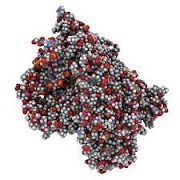Want the facts on the Turkey Enzyme? Learn more about the Turkey enzyme called tryptophan which is a precursor to serotonin…
People often feel like they’re in a food induced coma after Thanksgiving. This feeling is often attributed to the Turkey enzyme which is an amino acid called tryptophan. It is known to be present in turkey meat in very high levels and is believed to induce drowsiness in human beings.
Of course holiday fatigue is often more related to overeating different products and living an undisciplined week but the value of tryptophan in calming the nerves and inducing sleep cannot be discounted as it is revealed by different scientific studies. In fact some studies go so far as to show that excessive consumption of the amino acid tryptophan actually affects the human sense of trust.
What is the Turkey Enzyme Tryptophan?
An interesting thing to note is that tryptophan which is the turkey enzyme is not found naturally in the body. It is introduced into the human body by different food sources and converts into serotonin in the human body. Serotonin is a chemical which resides in the brain and maintains calmness and composure in humans.
You would think that if someone was consuming large numbers of proteins and turkey meat they would have a good deal of tryptophan in the body. However, that is not the case because there are five other amino acids which compete in the bloodstream to reach the brain along with tryptophan. Tryptophan is often the loser in the race to reach the brain.
Therefore you can conclude that large quantities of protein will actually reduce the levels of tryptophan in the human brain because the other amino acids are apparently stronger than this enzyme.
The Research at Oxford on the Turkey Enzyme
A very interesting research was conducted by Oxford University through a two member game titled the “Prisoners Dilemma”. The two options given to the teams were to make moves which would allow a player to earn money by taking it from another player or make moves where both of the players could make money. The idea was for both players to co-operate. Under normal situations, without any tampering, this occurred approximately 75% of the time.
However in the second stage a chemical serotonin inhibitor was introduced. Before the players began the game half of the group of volunteers was made to drink a concoction which reduced their tryptophan levels thereby reducing the total amount of serotonin in the brain. This group of volunteers was less cooperative than the others who were not given any chemicals and also doubted the trustworthiness of others.
The study activity reveals that a lack of serotonin or tryptophan in the human body could lead to lack of cooperative behavior in all age groups.
Since mutual cooperation always enhances brain activity and promotes positive reinforcement it is interesting to note that human beings who lack this chemical at optimum levels in the brain suffer from behavioral imbalances.
However since a lot of antidepressants utilize serotonin reuptake inhibitors you cannot surmise that the entire population trusts other people and more research needs to be conducted to establish the extent of the effect of tryptophan which is the turkey enzyme on the human body.





